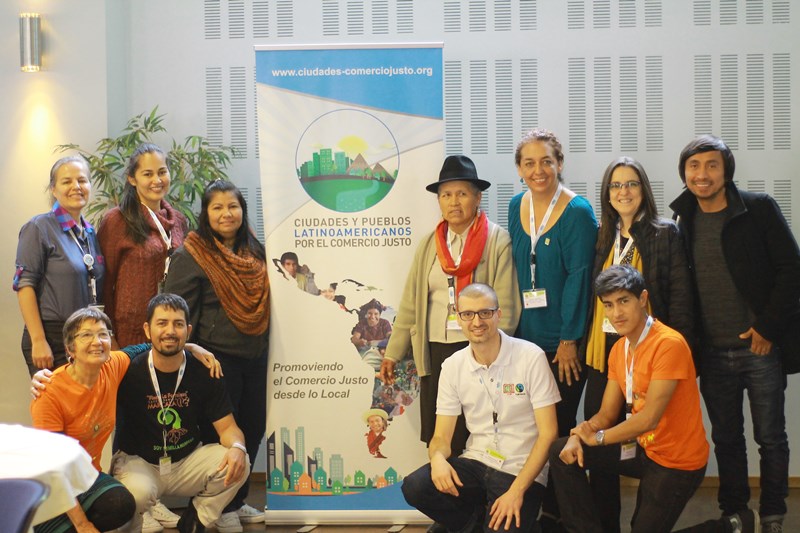Spreading the campaign in the South
2017-10-02

As you well know, to spread the campaign in the South is not an easy task. We do not have everywhere national fair trade organizations. Organized civil society does not work on fair trade like in Europe, for example. In Latin America, for example, there are no national coalitions working on fair trade, there’s no national unions’ platform, working on fair trade. In general, the concept of fair trade is not very known, and citizens/consumers are not well aware of their consumption power.
In Latin America, the most significant fair trade actors are the fair trade producers’ organizations, of course, and their national platforms. These platforms represent and defend the interest of fair trade producers, but they do not have economic and human resources to develop campaigns at national level and advocate in an effective and sustainable way. Only few of them are starting in the last years their first advocacy activities, with very few resources, but with great enthusiasm and the support of their continental networks.
Regional fair trade producers’ networks like CLAC, where I worked, does have human and economic resources to invest in advocacy activities like the fair trade towns campaign. Not so much, but it has. During these first 2 years of Latin American campaign, we demonstrated that if we invest good human resources and some economic resources we can reach different goals, for example:
1) to communicate (of course in Spanish) the meaning of the global campaign in the region and adapt it to the regional culture and situation. If some Latin American city gets interested in the campaign we can, of course, start the communication with them and raise its interest; in a direct and easy way. We did with Quito, which now is the first fair trade national capital city in Latin America, and we hope it can continue investing in its local campaign and promoting fair trade from the local level. Besides, we created several communication tools (like our web page, videos, infographics, banners, flyers and so on) and we published different articles and statements, like the two statements presented in the Bristol and Saarbrücken conferences;
2) to accompany producers’ organizations to start local campaigns in different countries. We did it in Ecuador (Riobamba), Honduras (Marcala), Paraguay (Arroyos y Esteros), Chile (Sagrada Familia), Costa Rica (Grecia) and Brazil (Boa Esperança). We hope to continue this work and deepen it in the future;
3) to start promoting at global level new campaigns’ activities, like the possible fair trade towns’ twinning or partnerships we are suggesting since 2015. But, of course, to do that, we need the interest of Northern fair trade towns. Those of you who were in Saarbrücken can remember Marcala’s proposal to the German city. We hope to start a better dialogue with different European national campaigns on this specific issue.
But regional coordinators also make a better link between the local levels and the global level. A small town in Brazil (like Poços de Caldas) or in Honduras (like Marcala) cannot have the global or regional view of what is going on in the Fair Trade Towns campaign. But, with regional coordinators, we can better describe the needs and progress of the region. That’s why it’s so important to have regional coordinators in the International FTT Steering Committee, from Latin America, Africa and Asia.
With regional coordinators, we can better defend the leading role of fair trade producers in this campaign. Those of you who were in Saarbrücken will remember the strength and the enthusiasm that the words of Rosa gave to us. The Fair Trade Towns campaign is an excellent advocacy tool for all the movement. With this campaign, we can really strengthen the movement all over the world. This means strengthening the different fair trade actors all over the world. And there are no doubts that the most powerful and important fair trade actors in the South are the fair trade producers’ organizations, platforms, and networks. Through regional campaigns, producers’ networks are strengthening the global Fair Trade Town campaign, and thanks to the regional fair trade towns campaign producers’ networks are being largely empowered by their advocacy processes.
That’s why we hope that the African and Asian fair trade producers’ networks can start dialoguing on possible regional campaigns, following the example of Latin America and the Caribbean and its “inclusive” and “producers-led” approach. Through regional coordinations, with the commitment of fair trade producers’ networks, we can really succeed in spreading the campaign also in the South. And when we will have 100 or more fair trade towns in the Global South everybody will for sure appreciate how important is to have regional campaigns, to support local and national fair trade organizations to develop their own campaigns.
Fair trade producers’ organizations are development leaders at local and national level and by campaigning for fair trade they can really demonstrate the impact of the movement in their empowerment processes.
Marco Coscione





















